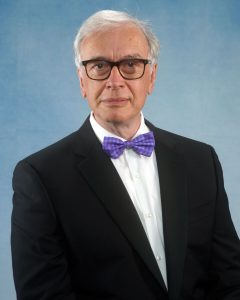 Eric Ghysels, Bernstein Distinguished Professor of Economics, will co-lead a new research initiative to support academic research, technical development and innovation in blockchain, cryptocurrency and digital payments. This multi-university initiative is called the University Blockchain Research Initiative (UBRI), and includes 17 universities around the world, including MIT, Princeton, University of Pennsylvania, University of California-Berkeley, the University of Texas-Austin, as well as eleven universities overseas. The financial-services start-up Ripple has provided $50 million in funding, with about $4 million coming to the UNC campus. UNC’s team will be based in the Kenan Institute of Private Enterprise.
Eric Ghysels, Bernstein Distinguished Professor of Economics, will co-lead a new research initiative to support academic research, technical development and innovation in blockchain, cryptocurrency and digital payments. This multi-university initiative is called the University Blockchain Research Initiative (UBRI), and includes 17 universities around the world, including MIT, Princeton, University of Pennsylvania, University of California-Berkeley, the University of Texas-Austin, as well as eleven universities overseas. The financial-services start-up Ripple has provided $50 million in funding, with about $4 million coming to the UNC campus. UNC’s team will be based in the Kenan Institute of Private Enterprise.
“Academia has traditionally been a critical driver of technical innovation. The University Blockchain Research Initiative is an acknowledgment of the vital importance of the unique role universities will play in advancing our understanding and application of cryptography and blockchain technology,” said Eric van Miltenburg, senior vice president of global operations at Ripple. Ripple connects banks, payment providers, digital asset exchanges and corporations to send money globally.
The blockchain technology is at its heart a distributed ledger: a database held and updated independently by each participant in a large network. The distribution is unique: while there may be thousands of participants in a blockchain the ledger of transactions is not downloaded from a central authority. Instead, the ledgers are independently constructed for each transaction and are held in common by every participant.
Interest in this technology has spread far beyond the towers of academia, as businesses, governments and individuals have recognized the possible gains in security and privacy from having such decentralized record-keeping. Our Economics students will benefit from the intensified attention to blockchain on campus due to the UBRI. As Ghysels says, “This interdisciplinary approach stands to benefit our Economics students, who bring both the technical expertise and the critical-thinking skills necessary to link coding with privacy and economic efficiency concerns.”

The Center for Regulatory and Industrial Studies (CRIS) began in 2017 as an initiative to support research in the field of industrial organization. UNC’s College of Arts & Sciences and the Economics Department generously provided seed funding for the initiative. Professor Jonathan Williams is the founding director, but he has the support of a large community of collaborators in the Economics Department whose research is related to industrial organization. We have also seen a surge in interest from graduate students who are writing their Ph.D. dissertations in the area of industrial organization and regulation.
Three recent initiatives illustrate the scope of the Center:
- Pat Bajari, chief economist of Amazon, visited the UNC campus in October 2018. He gave a well-received talk on campus and also met with our graduate students and faculty to discuss new research collaborations. Dr. Bajari is a fan of UNC Economics from his time at neighbor Duke University, and he expressed interest in partnering with the Center for upcoming research activities. (He also wanted our Ph.D. students to speak with Amazon about a job after graduation!)
- Professors Williams and Brian McManus received a research grant from the National Science Foundation in September 2018 to study the pricing practices of internet service providers in their related sales of television and internet access.
- Charles Duncan, Executive Vice President of Westjet (the second largest Canadian airline), came to campus in October 2018 to speak in undergraduate classes and meet with Carolina Economics faculty and grad students. Duncan graduated from Carolina with a major in Economics back in the day, and was able to provide the faculty and students with an applied glimpse of how regulation and competition intertwine to drive the commercial air travel market.
- The Center is just getting started, but we can already see great potential for faculty collaboration and for academic connection to business and policy-makers worldwide. Those connections will deepen our students’ understanding of how the world works.